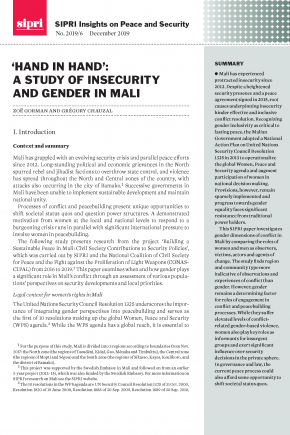‘Hand in Hand’: A Study of Insecurity and Gender in Mali
Mali has experienced protracted insecurity since 2012. Despite a heightened security presence and a peace agreement signed in 2015, root causes underpinning insecurity hinder effective and inclusive conflict resolution. Recognizing gender inclusivity as critical to lasting peace, the Malian Government adopted a National Action Plan on United Nations Security Council Resolution 1325 in 2013 to operationalize the global Women, Peace and Security agenda and augment participation of women in national decision making. Provisions, however, remain sparsely implemented and progress towards gender equality faces significant resistance from traditional power holders.
This SIPRI paper investigates gender dimensions of conflict in Mali by comparing the roles of women and men as observers, victims, actors and agents of change. The study finds region and community type more indicative of observations and experiences of conflict than gender. However, gender remains a determining factor for roles of engagement in conflict and peacebuilding processes. While they suffer elevated levels of conflict-related gender-based violence, women also play key roles as informants for insurgent groups and exert significant influence over security decisions in the private sphere. In governance and law, the current peace process could also afford some opportunity to shift societal status quos.
I. Introduction
II. Results and analysis
III. Conclusions


